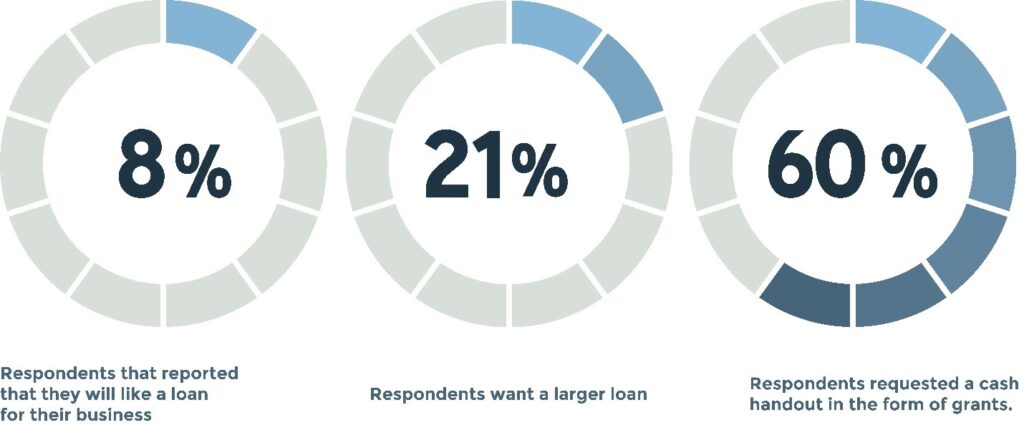By Rockefeller Philanthropy Advisors | February 17, 2022
As small business owners and managers are battling with finance, opinions have always been divided on what type of funding SMEs need to ensure judicial use of resources and also ensure the sustainability of the business. No doubt, small businesses need funds to tackle such issues as operations management, marketing, stocking, human resource management, expansion, diversification, etc. Apart from personal savings, funds from family members and friends, small business owners look forward to obtaining loans or credits from financial institutions for their business operations. However, grants have become an attraction to small business owners. Unlike loans in which the borrowers are expected to pay back, grants are not to be paid back.

As SMEs are less likely to obtain funds from financial institutions compared to larger firms, the rush for available grants or micro finances becomes more valid. Over the years, there have been debates on the type of funds that small businesses need to either grow or scale their operations. Small business owners and managers have not failed to show their preference for grants otherwise called ‘free money’ to all forms of loans. Data from the different rounds of the survey conducted under the Government Enterprise Empowerment Program (GEEP) showed a consistent pattern of preference of grants to loans or other forms of financing by small business owners and managers. The respondents were asked to indicate the type of funds they need to improve both their lives and their businesses especially after the peak of the Covid-19 pandemic. 21% of the respondents reported that they will like a loan for their business, 8% want a larger loan while 60%
According to economists, both loans and grants are important considerations for small business growth, however, there must be careful consideration in terms of the appropriateness of the type of fund.

Pros of Grants and Loans
|
Pros of Grants |
Pros of Loans |
|
Grants may seem very attractive to small business owners since they are essentially free money without obligation to pay back. This is because in some cases, small business owners find it difficult to pay back monies borrowed from financial institutions. |
Small business owners who may not want to endure the time-consuming and rigorous application processes of winning grants may opt out for loans or credits. Although qualifications for loans are equally demanding as not all small business can benefit from loans especially from formal sources. |
|
Information about grants is readily available and there are lots of resources on the internet on how and where small businesses can apply for grants. The grants could be from government interventions targeting specific sectors or industries and gender. |
However, loans can go a long way in turning the fortunes of businesses especially when the funds are judiciously utilized, and other factors needed for smooth business operations are ensured. |
|
While grants are considered as income and are subject to tax in most cases, loans are not considered as income. An important thing to know is that grants are usually highly competitive as businesses compete with one another to win. Businesses do not directly compete with one another when it comes to loans, this is because if a business satisfies the requirements from a lender, there is likelihood that the business will get the loan request. |
|
Cons of Grants and Loans
|
Cons of Grants |
Cons of Loans |
|
Grant application can be time-consuming, requiring lot of paper works and documentation. An applicant must also justify why such fund should be made available. In other words, small business leaders would have to put in a lot of work to convince the assessors on why their business should be considered from a pool of other applicants. Grants wouldn’t also help SMEs to build credit, and this often frustrates small business owners when they want to apply for loans. |
A source of worry for borrowers is that loans usually have limits. Small business owners may not be able to access the amount the intend using for their business. A concern here is that the SMEs will have to pay interests on any amount they obtain as loan.
|
|
|
Loans come with consequences. If an SME is unable to pay back at the right time and with the agreed amount, this could result to consequences that may not be pleasant depending on the loan terms. Borrowers try as much as possible to ensure discipline knowing full well that they are obligated to pay back any amount borrowed including the interest. |
Funding a small business is an important financial choice that requires careful consideration. Grants or loans are critical for small business growth. Whichever option one chooses should be given a great deal of care to ensure that the purpose of obtaining such fund is not defeated. SMEs should always look out for funding opportunities that will work for their business. In addition, one can find small business grants at government agencies, corporations, and individuals. A simple search on the internet can lead to opportunities for funds. Also identifying with SME-allied platforms will help.
In terms of government schemes, there are Bank of Industry funds for entrepreneurs, Africa Development Fund, etc. Some private individuals/organizations are also supporting entrepreneurs. These include the Tony Elumelu Entrepreneurship Program, Shell Livewire, etc.


